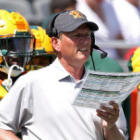Say this for Week 4 of the AAF season: it was full of surprises. That's mostly because it was a weekend of firsts. It was the first time the two lowliest teams in the Alliance, Atlanta and Memphis, notched their first victories. It was also the first time one of the two teams that entered the weekend undefeated, the Birmingham Iron, felt the bitterness of defeat.
One concern I had for this league in the first couple of weeks was whether it would go chalk for a majority of the season. Clearly, some teams were ahead of others, but was that ever going to change? Co-founder Bill Polian put together an allocation system to build each of the eight teams, but was that going to work?
Through one month, it appears so. Sure, Orlando is still the best team, but the gap is no longer a country mile. Plenty of other teams are starting to make some personnel changes, both at quarterback and elsewhere, and the results are paying off. Some teams are heading in the right direction. Others are not.
While this whole thing is still far from a finished product, the parity that was promised is a lot more evident now than it was at the beginning of February. Who knows what the next two months will bring?
For now, let's take stock of the lessons learned from a wild Week 4.
Apollos WR Charles Johnson looks like the real deal
In a perfect world, the AAF would send everyone back to the NFL. In reality, only a minority of players will get that coveted second chance. Through one month, no offensive player looks as ready for that chance as Charles Johnson. The former Grand Valley State product and seventh-round NFL pick in 2013 has been the poster child for what the AAF can do for a career.
"I don't know why he's in our league," Orlando GM Tim Ruskell told CBS Sports. "If you look around the [NFL], are there eight guys on 32 teams who are better than him? In fact, I know there aren't."
Truth is, Ruskell was being a bit rhetorical. Johnson is with the Apollos because of what Ruskell refers to as "slipping into the cracks." At 30 years old, Johnson is a veteran who would be considered by many to be in the twilight of his career. He'd be a second-contract guy in the NFL, and he has a history with injury problems and meager results (two career touchdowns, both with the Vikings). It was less expensive for a team to draft a wideout and sign him to a rookie contract than sign a snakebitten veteran player. So while there might not be 200-plus better receivers than Johnson in the NFL, there were probably 200 that were either more valuable or cheaper. That middle ground is a tough place to be.
But that was before Johnson broke through in the AAF. "We asked ourselves 'What would it be like if he was playing all the time?" Ruskell said.
The Apollos have an answer. In a 20-11 win over the Salt Lake Stallions, Johnson hauled in nine catches on 12 targets for 105 yards, marking his second 100-yard receiving game already this year. He entered Week 4 already leading the AAF with 305 yards receiving. He's equally capable of blowing the top off a defense as well as sitting on underneath routes.
His success is a combination of athleticism, experience, brains and work ethic, all of which Ruskell says rounds him out as a player. His rapport with quarterback Garrett Gilbert has given the Apollos an early advantage in the passing game as other teams develop their chemistry. "There's no route he can't run," Ruskell said. "I'm sure in his mind there's no one that can defend him in one-on-one coverage."
At Johnson's age, and given his production, he's a prime candidate to jump back into the NFL this year for what could be his last professional contract.
Iron's offensive problems finally caught up to them
Winning masks a lot of problems. Being 3-0 entering Sunday, Birmingham's offensive shortcomings were back-burner talking points because, well, they hadn't cost them yet ... until San Antonio showed up.
The Commanders had a perfect game plan on both sides of the ball, beating the Iron 12-11 at their own game. Mike Riley's team was content to run the ball (161 yards on 41 carries, doubling the Iron's offensive output in both yards and attempts), play solid defense (4.72 yards per play allowed) and keep just about everything in front of them; since Birmingham does not have much of a deep-threat passing game, zone coverages were largely effective.
Still, this was inept as Birmingham has looked on offense for the first month, and that bar was not set particularly high to start. Forget the final stats for a moment -- the Iron had three points through the first 58 minutes and would not have even been in a position to score a late touchdown if San Antonio hadn't sat back on defense. For context, the Iron had outscored opponents 38-6 in the second half prior to Week 4.
Let's examine what went wrong -- or, maybe more accurately, what has been wrong and finally caught up to the Iron. First: quarterback Luis Perez. He isn't solely to blame, but there are legitimate criticisms of his game. He doesn't have the strongest arm, his mobility is limited and he's more effective when he needs to make a play within the pocket rather than outside of it. He didn't play well on Sunday, finishing 19-of-39 through the air for 202 yards and a pair of interceptions. His first interception, in plus territory in the third quarter, was game-changing and a pass that never should have been thrown.
Iron were thinking 6, @ZSanchez15 stops the drive. #SAvsBHM pic.twitter.com/Pvq4zBiOxd
— The Alliance (@TheAAF) March 3, 2019
Frankly, he could have thrown at least another two more, but those weren't picked off. That's how rough Perez's decision-making was. One near-interception over the middle in the first half wasn't even the result of San Antonio disguising its defense. Perez, trying to fit a ball into a hole in the zone, simply didn't see a linebacker standing right in the ball's path. Even one of Perez's completions to Wes Saxton could have been intercepted, or at least deflected, by Commanders linebacker Joel Lanning. It would be unfair to say Perez has "regressed" because the sample size is too small, but he certainly has not improved on his solid debut.
Of course, Perez is not alone in this. Birmingham's offensive line hasn't opened many holes for a reliable run game. Wide receiver play has been well-documented as erratic with a bad case of the dropsies. In fact, no receiver on Sunday had more than three catches; running backs Trent Richardson and Ladarius Perkins, and tight end Wes Saxton each had more. None of these things are new revelations. With Orlando coming to town next week, though, Sunday's loss needs to serve as a stern kick to the posterior, reminding the Iron that averaging fewer than five yards per play is not a sustainable strategy for winning games. That being said, many of these problems are not fixed in a week, so if Birmingham were to upset the Apollos in Week 5, it will probably have to be in a manner similar to how they've been winning so far. By April, though, Birmingham needs to iron these kinks out for good.
Memphis' defense has become extremely disruptive
It's easy to say that the Express are a more legitimate team since switching to Zach Mettenberger at quarterback. And, yes, Mettenberger (18-of-25, 174 yards, TD) was a reason why the Express could even come from behind to begin with and beat San Diego 26-23 for their first win of the year. Without him, the offense doesn't move as well. This is all well and good and true.
But let's dissect the bigger reason why Memphis finally turned a corner: the defense is playing far better. From giving up 26 points to Birmingham in Week 1 -- the same Birmingham dissected above for its inefficiency -- to holding Orlando, the AAF's best offense, to 21 points in Week 3, the Express have shown tangible improvement on that side of the ball. Against the Fleet on Saturday, the Express allowed just three second-half points.
Without a doubt, losing quarterback Philip Nelson to a shoulder injury hurt the Fleet, but Mike Singletary's defense had the right plan to attack backup Alex Ross. The Express ended the game with four sacks, six quarterback hurries and seven tackles for loss. They also broke up seven passes and forced four turnovers -- three fumbles and an interception. That's disruption.
Look back at it 👀
— Memphis Express (@aafexpress) March 2, 2019
Drew Jackson (@Jack_Flippa) delivered a huge INT to set Memphis up for a TD to close the half. pic.twitter.com/MSH62PuMBI
The play that secured the W.
— Memphis Express (@aafexpress) March 3, 2019
✈️ | #AllAboard pic.twitter.com/rBJ5Ckg3Pl
The Express travel to Atlanta in Week 5, so the opportunity is certainly there to keep the momentum going. Even at 1-3, multiple general managers said this past week that Memphis is low-key a team that they wouldn't want to play at the moment.
San Antonio has two legit running backs
Charles Johnson is one name that you should expect to see in the NFL next fall. San Antonio running back Kenneth Farrow II is another. Farrow finished Sunday's win over the Iron with 142 yards on 30 carries -- both single-game highs for the AAF. Farrow has 422 yards rushing on the season and has been arguably the most complete back in the Alliance with his productivity, balance, power and speed.
He's not the only option the Commanders have, though. People within the organization have been high on Trey Williams, who had the team's only touchdown -- a 12-yard run that showed nice burst through the hole. Don't be surprised if Williams gets more touches moving forward. San Antonio legitimately feels it has a running back by committee backfield. Leaning on the run worked against the Iron and very well could be the identity of this team.
Run it in. ‼️😏@twll3 #TakeCommand⚔️ pic.twitter.com/zfEIgf3ytD
— San Antonio Commanders (@aafcommanders) March 3, 2019
Matt Simms may have just been Wally Pipped
Memphis became a different team when it replaced Christian Hackenberg with Zach Mettenberger. The same could be said for Atlanta when Aaron Murray came in for an injured Matt Simms during Sunday night's 14-11 win at Arizona. Was Simms, who left in the first quarter with an injury, just Wally Pipped? All Murray did was lead the Legends with 308 yards of total offense (254 passing, 54 rushing) in their best offensive performance of the season (454 yards, 25 first downs).
It's not fair to blame Simms for Atlanta's pre-existing red zone issues, let alone their 0-3 record coming into Sunday. Simms wasn't even the worst part of the offense, as he was still putting up some numbers (647 yards passing) and moving the sticks. If coach Kevin Coyle does stick with Murray, which would be the smart call, Simms shouldn't be cast aside as a player who did nothing. However, what Murray brought to Atlanta off the bench is absolutely worth keeping. He dealt to nine different receivers and opened up the running game by forcing defenses to respect his legs on both designed reads and scrambles.
As with the Mettenberger-Hackenberg situation, it's natural to wonder why a quarterback change wasn't made sooner if the backup plays better than the initial starter. Regardless of the reason, Atlanta has its new quarterback, and like Memphis, is a more dangerous team because of Murray.
Hotshots moving in the wrong direction
No team in the AAF is sliding in the wrong direction faster than the Hotshots. After starting 2-0, Arizona has lost two straight to a pair of teams who are a combined 2-6. And if you really want to get technical, this team hasn't looked good since opening weekend. The loss to the Stallions on the road in Week 3 was technically an upset given the spread, but probably not a huge surprise all things considered. Losing at home the next week to a 12-point dog and the lowest-scoring team in the AAF? That's a red flag.
So what happened to the team with the best preseason odds to win the AAF title? For one, the scoring has gone down ... way down. After putting up 38 in Week 1, Arizona has scored 20, 15 and now 11 in the past three weeks. It's not for a lack of playmakers, either. Rashad Ross remains one of the Alliance's top receivers with five touchdowns and Josh Huff is perfectly capable as well. Running back Jhurell Pressley had 110 yards on just 14 carries Sunday night. However, the Hotshots were also just 4-of-11 on third downs and ran just 58 plays to Atlanta's 74. Arizona's longest drive of the night was 13 plays and resulted in a field goal right before halftime.
Which takes us to the defense. It wasn't just that Arizona was giving up plays to Atlanta. They were giving up big plays -- chunk yards, including four of at least 30 yards. Facing a mobile quarterback off the bench can oftentimes throw a wrench in the defense, but those numbers are bad regardless of the opposing team and quarterback.
Next week is a game against San Antonio. To potentially enter the halfway point of the season on a three-game slide considering the high hopes for the Hotshots before the season would easily be the AAF's biggest disappointment.
Player of the Week
Memphis defensive end Corey Vereen/linebacker Drew Jackson: Screw it, POTW is a shared award this week. The Express allowed just three points in the second half vs. San Diego, and Vereen and Jackson came up huge. Jackson led the Express with 13 tackles, including four for loss, along with four pass deflections and an interception. However, Vereen had two strip-sacks that changed the tide of the game. Both deserve to be recognized.
















